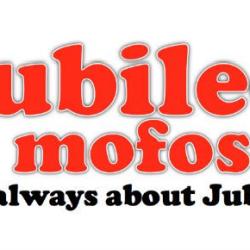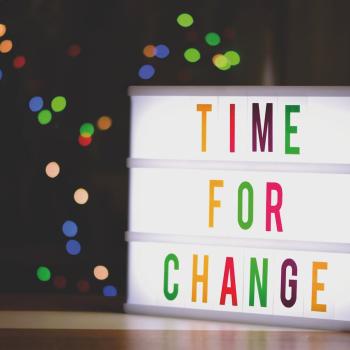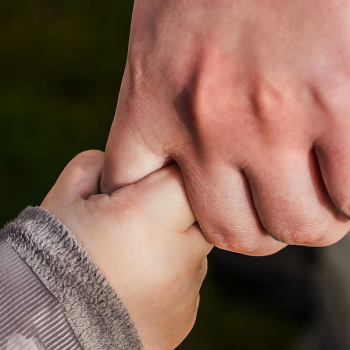Now Featured in the Patheos Book Club
Life's Too Short to Pretend You're Not Religious
By David Dark
"No one doesn't believe in God as much as I do," a slightly intoxicated friend assured me as we huddled together in a busy restaurant one Saturday evening. I knew we were in for an extraordinary conversation. Sometimes this kind of thing comes up when I'm asked what I do.
When I could honestly call myself a high school English teacher, my responses generated less heat. Someone might recite Shelley's "Ozymandias," recall a beloved teacher or ask for a reading recommendation, but it rarely took a turn for the intensely personal. Now that I work with undergraduates, they want to know what it is I teach, exactly.
Religion.
But what classes?
Bible. World Religions.
And now we're awash in the prickliest of questions—the existence of God. The moment my friend asserted his superlative disbelief in God did not come out of the blue. We'd been at it a while on the subject of weird religious backgrounds (his and mine), life after death, music, science and all the different things people say the Bible says. I suspect I surprised him a little when I noted that we read it badly until we learn to read it as a collection and that, wherever one lands on the question of the existence of God, the Bible's likely as good as it gets when it comes to challenging everyday injustice.
He wanted to know if I believed it, and I assured him that I did. But I described my love for the Bible with so many seemingly diverse points of entry that he seemed a little taken aback: Kurt Vonnegut's devotion to the Sermon on the Mount, the ethical momentum set in motion within human societies by the prophets, the vision of beloved community in the civil rights movement and my own dependence on the wisdom of my incarcerated students. Before we knew it, we were talking about the power of love, the joys and difficulties of true neighborliness and the long-haul work of human hopefulness. Who would want to be a hater when it comes to these things?
It was right about then that he felt understandably compelled to drop a clarifying word amid our escalating love fest: "Nobody doesn't believe in God as much as I do." Boom. Was it something I said? Can we still be friends?
I was pleasantly stumped and strangely excited. Why the rush to disassociate? Is there a problem? Did he think I was trying to sell him on something? I wasn't looking to keep him on any kind of hook or ask him to sign a statement of belief, but I so didn't want our commonality to end. I wanted him to know—and said so—that he was kin to many a psalmist, poet and pilgrim within the Bible who shared his disbelief. I wanted him to believe that there was still so much we could have a good time talking about. Was there a way I might playfully overcome this defensiveness? How might I keep the frequency open?
Here's what I'm up to. I come to you as one bummed out by the way people talk about religion. Be it an online rant, a headline, a news report or a conversation overheard, I feel a jolt of sympathy pain whenever someone characterizes someone else as religious. It's as if a door just got slammed. And in a subtle, hard-to-get-a-handle-on kind of way, it's kind of like someone's been told to shut up.
This is the way it goes with our words. When I label people, I no longer have to deal with them thoughtfully. I no longer have to feel overwhelmed by their complexity, the lives they live, the dreams they have. I know exactly where they are inside—or forever outside—my field of care, because they've been taken care of. The mystery of their existence has been solved and filed away before I've had a chance to be moved by them or even begun to catch a glimpse of who they might be. There's hardly any action quite so undemanding, so utterly unimaginative, as the affixing of a label. It's the costliest of mental shortcuts.
Of course we get to call it like we see it. What else can we do? But when we do so with undue haste, when we're neither remotely inquisitive nor especially curious in our regard for other people, we may find that a casual demonization comes to pepper our conversations. This is why it often seems to me that calling someone liberal, conservative, fundamentalist, atheist or extremist is to largely deal in curse words. It puts a person in what we take to be their place, but it only speaks in shorthand. When I go no further in my consideration of my fellow human, I betray my preference for caricature over perception, a shrug as opposed to a vision of the lived fact of somebody in a body. In the face of a perhaps beautifully complicated life, I've opted for oversimplification.




